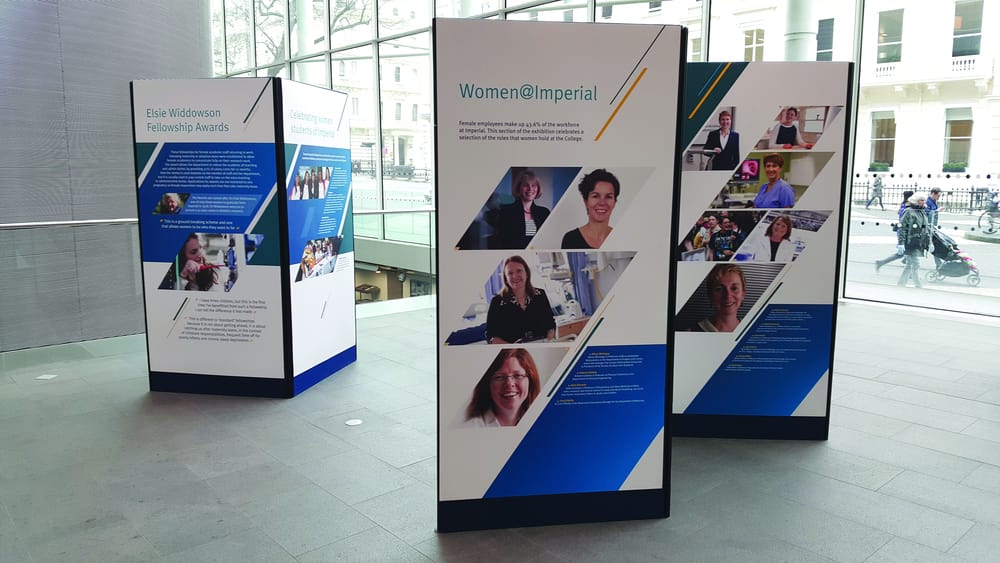The women of Imperial
We take an uncensored look at female staff, graduate, and fresher experiences around college

The odds are good, but the goods are odd, or so goes the saying on the ‘talent’ at our beloved university. It’s an oft-referred trope of Imperial: on open days, we’re warned that there’s no shortage of dudes, and forced conversations during freshers’ week often resort to, “Wow, there are loads of guys here!” We’re always talking about the male experience, or lack thereof in terms of sexual opportunity, but what of the women of Imperial?
We didn’t perch on the Queen’s Lawn lions with a DSLR, waiting to pounce on people Humans of New York-style, but rather asked some women to talk about their female specific experiences at Imperial, whether they were good or bad, and how small, dismissable things effected their existence as a woman at a university where 64% of us are guys.
The whitewashed Women@Imperial exhibit by the revolving doors of the Business School only tells part of the story. Much like brands’ obnoxious use of International Women’s Day to promote their wares on social media, efforts like this can feel contrived. We all know that workplaces have a problem with diversity at their highest level, and Imperial is no different.
After ‘Misogyny at Varsity’ last year, when a Sport Imperial employee said he “didn’t care how those fat girls got home”, Imperial commissioned an investigation into the culture of gender, which is currently being conducted by external academics. But then we had the very Provost who commissioned it, Debra Humphris, leave us for Brighton.
The Angry Grad makes a triumphant return below. Despite initial speculation that the FELIX comment’s outspoken columnist was a man, she ain’t. Angry Grad is a job-having graduate who’s been through the Imperial system, and experienced the medical school with all its foibles.
FELIX: What kind of attitudes did you encounter from students or teaching staff on the subject of gender?
Angry Grad: Staff thankfully treated me equal to my male counterparts. However, my student experience was quite different. In fact, it’s kind of made me aware that some of my mates are downright sexist – I’m possibly having such a bloody epiphany right now that I may need re-think my friend circle as a SIW (strong independent woman).
For example, from good ideas in a tutorial to a friendly conversation with a lecturer, I’ve been made aware that some of the affirmation I may have gotten is likely is due to my gender, as “professors are nicer to girls.”
This passing comment didn’t bother me much at the time, and I’m sure many of you have heard this too. Hell, if anything, one up for the girls, right? Yet on second thought, the connotations associated with such remarks are downright disheartening. They imply that any achievements I may have made are, perhaps, not worthy of the merit they received. They imply that, because I’m a woman, academics who are aware of my soft nature, inability to deal with critique, and low self-esteem, have given me credit where it isn’t due.
Some mates of mine have gone as far as to say that members of their year probably got into Imperial because of their boobs, not their brains. This cynicism is pretty disgusting, and if anything, transparently shows the insecurity of my peers who feel threatened. While yes, all of these remarks have come from men, women shouldn’t be so blasé and simply accept them. The idea “bat your eyelashes and you’ll get your way” implies we have it easy, in whatever we endeavour to do, which couldn’t be any more opposite of our reality.
Remember the suffragette movement, kids? Hardly glamorous was it. So, what I’m trying to say here is it’s not the attitude of just men that needs to change. Rather, it’s society’s attitude towards women. Sounds obvious I know, but it’s the subtle things that make all the difference, like these niggly comments here and there. Our achievements should be celebrated, men and women and alike, and shouldn’t be scrutinised because of gender differences.
When I have been called a lad before, I’ve taken it as a compliment
FELIX: How did the gender ratio affect you, if at all?
AG: Not at all to be honest. My course was a bit of a fanny fest, so I never really experienced isolation as a female, which Imperial is notorious for.
FELIX: Did you feel like one of the lads whilst you were doing your degree?
AG: I’ve never been a “girly girl,” which is a description that is sexist in itself, but alas the stereotype fits the point I’m trying to make (#doublestandards).
In short, whilst I never have felt like one of the lads, the comment has been passed numerous times. Am I offended by it? It’s a difficult one. If it implies that I’m not a Regina George, then no. But if it also means that I am not feminine, then 100% yes. Being feminine in my opinion, has become synonymous for being quiet and soft. Yes, I’m boisterous, bossy and some people have even called me intimidating. But it upsets me that these take away from my femininity, and are more associated with a male stereotype. The worst thing is, when I have been called a lad before, I’ve taken it as a compliment; people are saying that I’m not a gossiping, make-up obsessed, shallow girl. But the fact that I myself have leapt on first thought to such conclusions, is pretty worrying. I consider myself a feminist after all, and if I myself associate femininity with such values, how do I expect others not to?
I’m not trying to be entertaining and my opinions are not a joke. Is it time to shut up?
Angry Grad felt conflicted between proudly wearing her badge of being ‘one of the lads’ to her own discount of femininity as a weakness.
Should you call out your mates when they’re problematic and run the risk of pissing them off? Simran, a fresher from the RSM, had this to say.
FELIX: What issues do you think you deal with as a woman of colour at Imperial?
Simran: I feel like I have to work to prove myself to my peers. Sometimes I feel like people expect me to represent everyone from my background, which is a lot of pressure. During first term, I’d get asked a lot about my background (and then my parents’ background, when I’d say I’m from London) and often I’d get a response like “Afghan girl from state school to do engineering? You must have been an admissions statistic dream!” Or even worse “Your parents were REFUGEES?! WELL DONE!”. It’s a sort of motivation, when it isn’t totally depressing.
FELIX: Are you ever made aware of your gender in your department?
S: As with any engineering department, Materials is quite male-dominated, so I’m definitely aware of the gender dynamic. The atmosphere, and the sorts of comments people make are influenced by it. I often find myself having to explain why rape shouldn’t be a punchline. People know this already, but I feel there’s a competition to say the most twisted laaaaaad banter joke, because that’s somehow manly and deserving of respect.
FELIX: Is having female lecturers important to you?
Simran: In the materials department, there are quite a few female lecturers. I love seeing them, partly because it helps me see a place for myself in academia. I think they’re criticised more, and in a different way to their male counterparts. “Why doesn’t she panopto? What a hoe,” “She’s in a bad mood cos she’s put on even more weight over the weekend” or “maybe she’s on her period” .
People don’t like to be criticised, often I am accused of attacking their freedom of speech
FELIX: What impact do ‘small’ comments have on your experience as a woman?
S: It’s difficult. Mostly I find them frustrating – I don’t know what the best way to react to them is. For the most part, I don’t think sexism is thought about before they are made. I don’t think people are immediately aware of their biases and why they want to use slut as an insult when they refer to a woman. Instances like this are so common that I start to feel like a broken record.
People don’t like to be criticised, often I am accused of attacking their freedom of speech. My new nickname is ‘PC Simran of the thought police’. People don’t understand that small comments show attitudes which breed actions, and their TOP BANTS is fuelling discrimination. They say that they would “never actually DO anything discriminatory.” I don’t think that’s good enough. It’s become something of a joke – someone will say something horrible in a group chat and wait till Simran reads it. I’m not trying to be entertaining and my opinions are not a joke. Is it time to shut up?
FELIX: Are they any other incidents that stand out?
S: I was talking to one of my friends about this. In a tutorial she was told by one of her peers to write on the board because “everyone wants to look at the pretty girl”. When we spoke about it, I found that many of our friends saw this as “just a compliment” and not a horribly sexist example of objectification. Another time, I was drinking juice from a straw in a lecture and a comment was made about how it looked like I was fellating the straw. I made a snarky comment in response, but haven’t had an innocent carton since.

There are more men at Imperial, however, I think that being a man is by no means the default
Celeste van den Bosch is a PhD in materials, and is the postgraduate representative for the Athena Swan committee for the department.
FELIX: Are there any challenges you face in the department that your male counterparts do not?
Celeste: In my experience working as first an Undergraduate in the Chemistry Department and now a PhD student in the Materials Department at Imperial I haven’t felt as though there is a difference in the challenges faced by students of different genders. On the news and through social media, a number of issues which can affect women in the workplace are often touted, notably gender based harassment, unequal pay and lack of family support. To address these, I am funded by EPSRC which provides a set stipend for PhD students and while it hasn’t been important in my life yet, talking to postdocs in the department I understand that the Department of Materials is supportive of expecting mothers.
FELIX: Is being a man at Imperial the default?
C: It is a fact that there are more men at Imperial, however, I think that being a man is by no means the default. In my experience, all students are given an equal opportunity at Imperial. I think there should be more women in science. This is something that needs to be addressed by society as a whole, rather than Imperial specifically, so that more girls are encouraged to follow a Science, Engineering, Technology career path.
FELIX: Are women at Imperial supporting each other as much as they could be?
C: I don’t think it’s a question of women supporting other women, I think it should be people supporting people. I do have a female supervisor and there are a number of other female PhDs, as well as women on the academic and technical staff within the department that I talk to. But equally I also count on fellow male PhD students, academics and technical staff for support and stimulating conversation. I trust that they feel the same way about my contributions.







